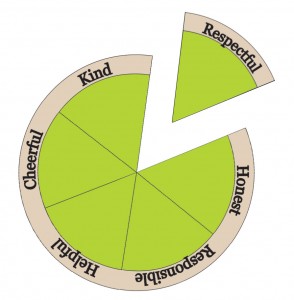Pie Details
Easy As Pie Details
How many times have you been so frustrated by your children that you shouted at them, “I’ve had it! You’re forbidden to play on the computer for the rest of the day?” or “We don’t hit in this family! Go to your room! You’re grounded!” or “If you don’t behave, you’ll be spanked!”
These typical responses are the result of your having reached the end of your “parenting skills” rope. You’ve tried everything: talking, coaxing, reminding, bribing, and nothing works. What’s left?
Children do need to be disciplined, don’t they? Yes, but how – that’s the thing. The old ways don’t work. There’s a newer way: Easy As Pie. It takes the recrimination out of discipline, and makes behaving better a responsibility-building rewards system.
Parenting becomes Easy As Pie.
Children learn by experience. You can tell a child until you’re blue in the face not to touch a pot, that’s it too hot. But the child won’t listen until he or she actually burns a hand. That pain, that experience, that memory is now “hot.” Your child will make future decisions around hot objects based on that experiential memory. But using pain as a disciplinary tool only backfires. Just as children avoid “hot” things, they’ll grow to avoid you: you’re too “hot” to be near.
What motivates children is fun. That’s what Easy As Pie does, and that’s what this system does. I help moms discover the activities and things that their children love (like screen time, toys, desserts, bikes, story time, etc.), which I call motivators. Then I show moms how to use these motivators to help their children make positive behavioral choices.

Here’s how it works:
Easy As Pie uses six magnetic pie pieces that create a circle (or pie). Each piece has a virtue printed on it: Respectful, Responsible, Kind, Helpful, Cheerful, and Honest. The six pieces sit nestled in a circle on the refrigerator. When all the pieces are there, the pie is “whole.”
When a child behaves in a way you don’t want in your home (such as jumping on a sofa), then you remove the corresponding action piece from the pie, in this case the one labeled Respectful. That means the pie – and the child – is no longer “whole.” While your child is “Not Whole,” his or her motivators (the bike, the toy, etc.) are not available. In order to get that thing, in order to make the pie “whole” again, your child needs to practice a respectful behavior to get their piece back.
It turns out that children become highly motivated to get their pieces back. That’s because as soon as they and their pie are “whole,” then they can have fun. Children soon learn that it’s far easier to keep their pies whole by choosing behaviors you want in your home.
The Process of Behavior Shaping with Easy As Pie
- A child misbehaves.
- A parent labels the behavior.
- A parent removes the relevant pie piece.
- A child decides to earn their piece back.
- A child asks you for help.
- You give her some suggestions.
- Child completes task willingly.
- You return the pie piece.
- The pie becomes whole again.
- The child receives the “motivator”.
- The child goes off to play.
- Peace reigns.
So, now let’s take a look at shaping behavior in real life:
Your daughter jumps on the sofa. You don’t want this behavior, but you’ve let her do it so many times she’s learned it’s an acceptable misbehavior.
Now, though, what you say is this: “I’m sorry, Jenny, you’ve lost Respectful.” You walk to the refrigerator and slide her Respectful piece out of her pie. Although it’s your job to help her earn her piece back, it’s Jenny’s job to figure out when she earns it.
Jenny may read a book for 20 minutes and then decide she wants to play a computer game.
Your response is, “I’m sorry sweetie, but your pie isn’t whole. Would you like me to help you earn your piece back so you can play on the computer?” So now, Jenny is highly motivated and wants to get it done as quickly as possible.
That’s when you say give her some choices: such as picking up her socks and underwear off the floor and putting them in the laundry hamper; or……
Jenny makes a choice and zooms off to accomplish the task.
When she is finished, you return the missing piece and say, “Thank you. That was very respectful. Now you can go play.”
What makes Easy As Pie revolutionary is that parents and siblings share responsibility to make the Pies whole as quickly as possible. This creates teamwork and bonding between family members.
This creates harmony.

